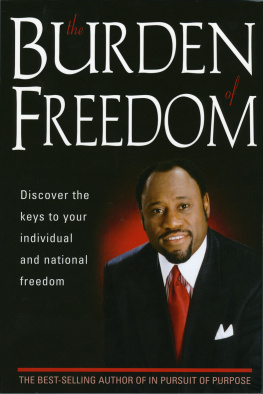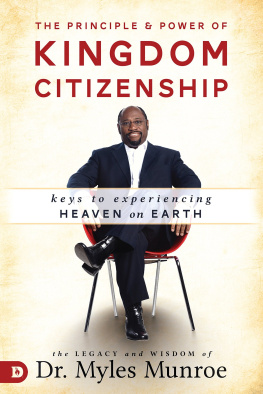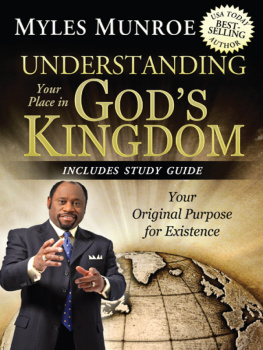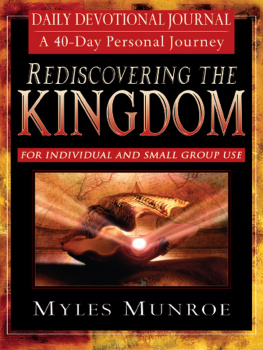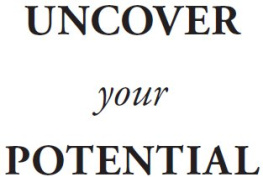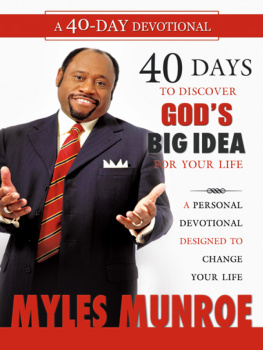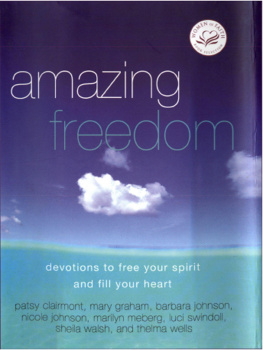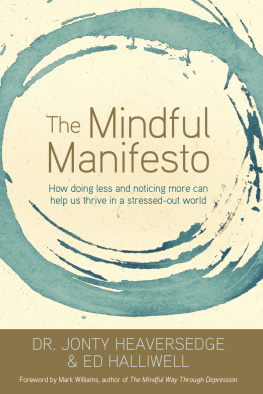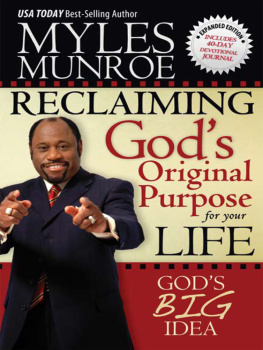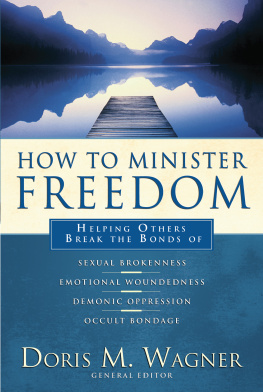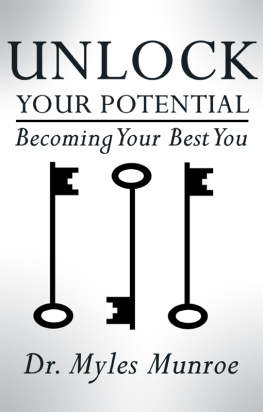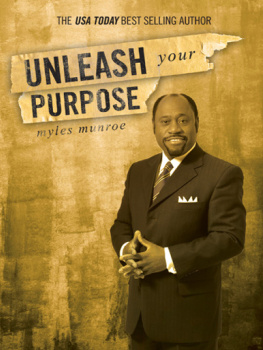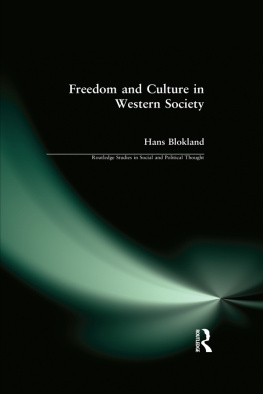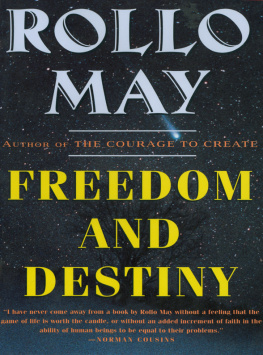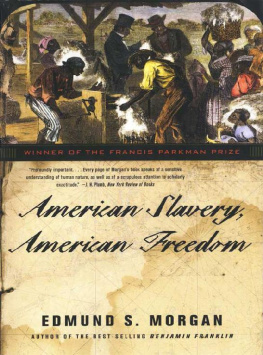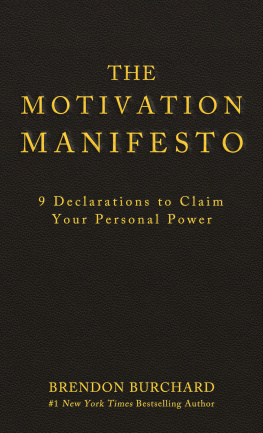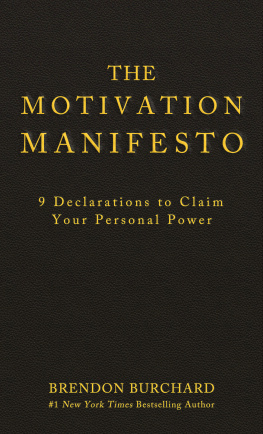DEDICATION
To the resilient human spirit buried under centuries of oppression and inhumane treatment screaming for freedom to express its true potential.
To the billions of individuals categorized as Third World people who have yet to fully participate in and benefit from the vast resources and products of the industrial revolution.
To the renowned and unknown champions, both past and present, who gave their best and paid the ultimate price for the deliverance and freedom of people.
To the generation destined to go beyond deliverance into the land of true freedom to experience the fullness of Gods purpose and plan for mankind.
To the Truth who sets us free, and His ultimate sacrifice, which made my freedom possible.
ACKNOWLEDGMENTS
The journey to true freedom requires the help of many along the way. We are all products of the input, investment, encouragement, criticism, knowledge and advice of many individuals whom we are privileged to meet along the way of life. This manuscript is the culmination of the work and support of many of these special people in my life.
I would like to thank Stephen Strang and the great staff of Charisma House, who believed in the potential of this project: Rick Nash for his persistent pursuit of me in spite of my hectic travel schedule; Mark Norris for his humble spirit and helpful input in the development of the manuscript; Barbara Dycus for her coming on at the last stages and making it work.
I must also thank the members and leadership team of Bahamas Faith Ministries International, on whom I had the privilege of testing and sharing the ideas in this book.
My understanding of freedom was greatly inspired by my friends and colleagues in the International Third World Leaders Association, a group of leaders committed to the freedom of all people, especially those in Third World developing nations. Thank you.
Finally, there are the people whose support and belief in me make my work possible: My darling wife, Ruth; my precious children, Charisa and Chairo (Myles Jr.); my late mother, Louise; my beloved father, Matthias Munroe; and those throughout the world whom I am privileged to call friends. Thank you.
CONTENTS
by Rev. Floyd H. Flake
3 Irresponsibility:
Freedoms Deadliest Enemy
D r. Myles Munroe has used this treatise as a means of giving clarity to the word freedom, which is often misstated and misunderstood. He challenges the notion that freedom can be manifested without the assumption of responsibility and accountability. He also puts freedom in a context that bespeaks a much higher and nobler meaning than is understood by many persons who use the term so loosely.
Dr. Munroe answers poignant questions about freedom relative to the age of technology and E-commerce, which has evolved with meteoric speed. On one level, this evolution has freed society from the bondage of functioning according to historical managerial patterns. However, it has also caused many to become enslaved to a system that has the potential to stymie creativity and intellectual development. He helps us to understand that freedom comes at a price.
Freedom for Dr. Munroe is the central theme and value of Christianity, so he challenges us to seek freedom, but to do so with a desire to maintain our value systems and to exhibit wisdom and character. Ultimately, he impresses upon us the central idea that the journey from slavery to freedom is a difficult though necessary one. But as we take the journey, we must not leave behind the principles and practices that help us to live a truly free life. Implied in this is the spiritual truth that those whom the Lord sets free are free indeed.
THE HONORABLE REV. FLOYD H. FLAKE
PASTOR
U.S. CONGRESSMAN, RETIRED
I t is a fact no one can denytoday freedom stands unchallenged as the supreme goal and value of the Western world. Scholars and philosophers have investigated and debated it endlessly; it is the catchword of every politician, the secular gospel of our economic free-enterprise system and the foundation of all our cultural activities. Freedom is the one value for which many people, by their words and actions, often seem prepared to die. During the era of the Cold War, leaders of the West divided the world into two regional campsthe free world and the unfree worldand were willing to fight a nuclear war to defend this sacred ideal.
For many years now I have traveled throughout the world as a conference speaker, seminar teacher, university lecturer, government consultant, pastoral counselor, motivational speaker and trainer for many organizations. Whether it was in Africa, South America, Asia, North America or the Caribbean, it was amazing to discover that people are all the same. In the poorest village of Brazil or the wealthiest country clubhouse of the aristocracy, every human heart cries and yearns for the same thing: a chance to fulfill his or her dreams and desires. Even the poorest man has a dream. All humans possess the same desireto be free to pursue the vision and dream in their heart.
However, for most of the over six billion people on Planet Earth, this dream will end in a hopeless nightmare, not because of their lack of desire or willingness to see their dream become reality, but because of man-made circumstances and self-imposed limitations that gravitate against this desire and prevent the discovery, release and maximization of their potential. The human spirit was endowed by its Creator with the need to be free to pursue its purpose and to experience the fulfillment that comes with maximizing its potential. Freedom is the pursuit of the human spirit.
The word freedom has become common, overused and abused, like the word love, but little understood. Much of what we call freedom is but a corruption of our desire to have license to live without laws and accountability. The echoes of the cry for freedom are heard throughout the halls of history as individuals, generations, communities and nations seek to throw off what they perceive as restrictive yokes and burdens of oppression.
Throughout history the accounts of peoples and nations fighting and paying the ultimate price for this illusive quality give evidence of its value to the human experience. Millions have died in wars, civil unrest, uprisings and rebellions in pursuit of its promise. More human life has been sacrificed in the name of freedom than any other passion. The French Revolution was born out of the desire to throw off the yoke of monarchal oppression. The Russian Revolution was ignited by the same spark. The breaking away and formation of the Republic of the United States was fueled by the hope for freedom. The death-wish commitment of notable men like Mahatma Gandhi to see the great nation of India throw off the yoke of colonialism was propelled by the cry for freedom to determine ones own destiny. The great Civil Rights Movement of our generation, inspired by the likes of Martin Luther King, Jr., was also conceived in the womb of the desire for freedom.
Even now after entering the twenty-first century, the struggle for individual, community and national freedom continues. However, despite thousands of years of human effort to achieve an enduring and stable state of freedom, most of humanity finds itself still enslaved to bondages that hold it back and suffocates personal and national dreams. The flower children and hippies of the sixties demanded their brand of freedom, and became prisoners of the drug culture and slaves to materialism. These baby boomers produced a generation of children after their kind who fell prey to a more diabolical drug web, which strangles the life out of their purpose for life.
We now enter the age of computer technology with its promises of freedom of communication, information advancement, increased productivity and cyberspace travel over the Internet. This explosion of technological progress has rendered the twenty-first-century technocrat an overburdened fish caught in the worldwide web of confusion in an ocean of excessive information. Oh, to be free!
Next page
